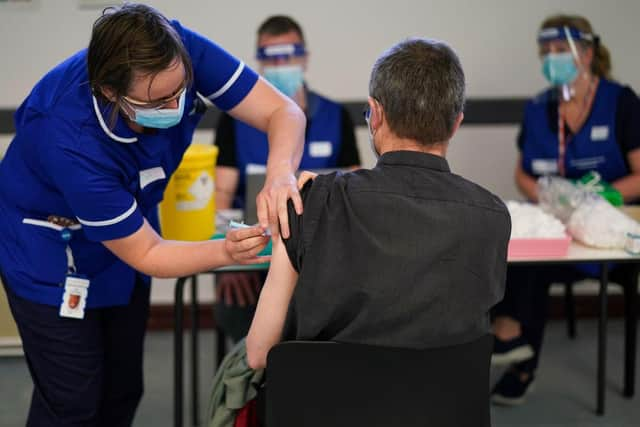How long after a Covid vaccine can you get a reaction? Common side effects explained - and when to see a doctor
and live on Freeview channel 276
More than 25 million first doses of a Covid-19 vaccine have now been given in the UK, with the government on course to meet its target of vaccinating everyone over 50 by mid-April.
Despite an expected slowdown in vaccine supplies next month, as the focus shifts to administering second doses to those who were inoculated earlier in the year, it is hoped that every UK adult will have been offered their first jab by the end of July.
Advertisement
Hide AdAdvertisement
Hide AdData from Public Health England (PHE) has indicated that the vaccination programme has already prevented more than 6,000 deaths among the most vulnerable in society so far, with the government urging people to go for their jab as soon as they are eligible.


But what can people expect after getting the vaccine? Here’s everything you need to know about possible side effects.
Will I get side effects from the vaccine?
Some people may experience side effects after receiving a Covid-19 vaccine. These symptoms are usually mild and are normal signs which indicate that your body is building protection against the virus.
However, side effects do not occur in every case with some people experiencing no symptoms at all.
Advertisement
Hide AdAdvertisement
Hide AdIf you do experience any side effects, these will typically only last for a few days.
The most common symptoms of the coronavirus vaccine may include:
tenderness, swelling and/or redness at the injection site headache muscle ache feeling tired fever (temperature above 37.8°C)
A less common side effect may include swollen glands in the armpit or neck, on the same side as the arm where you had the injection.
Advertisement
Hide AdAdvertisement
Hide AdThis symptom can last for around 10 days, but if it lasts longer than this you should see your doctor.
What if I get a fever?
It is fairly common to develop a fever after getting a Covid-19 vaccination, and this usually happens within 48 hours of having the jab. Symptoms will then usually subside within 48 hours.
If your fever starts more than 48 hours after your vaccination, or lasts longer than 48 hours, you should self-isolate and book a coronavirus test.
Can I take anything for the symptoms?
You can take painkillers, such as paracetamol and ibuprofen, to help ease any post-vaccination side effects you might have.
Advertisement
Hide AdAdvertisement
Hide AdIt is not recommended that you take these medicines before your vaccination for the purpose of trying to prevent side effects.
To reduce pain and discomfort from the site of the injection, you should apply a clean, cool, wet washcloth over the area, and use or exercise your arm.
To help minimise discomfort from fever, make sure to drink plenty of fluids.
Will I get side effects with the second dose?
Side effects after your second dose are likely to be more intense than the ones experienced after the first.
Advertisement
Hide AdAdvertisement
Hide AdThis is completely normal and is a sign that your body is building protection against the virus.
It is important to get two doses of the vaccine, even if you have mild side effects after the first dose.
In both cases, symptoms should only last for a few days.
When should I see a doctor?
If side effects from the vaccine are still ongoing after a few days, you should contact your doctor for advice.
If you are worried about any symptoms you experience, you can phone the NHS 24’s 111 service for help.